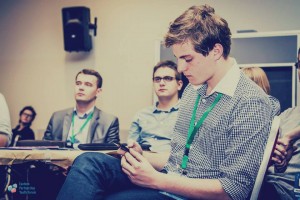The Eastern Partnership Project concluded last November in Autumn Agora Zaragoza, where their results were presented. But that does not mean it is over. The latest developments in the countries of the Eastern Partnership, and especially the EaP Summit in Vilnius, have shown that there is still a lot of work to do, and so The AEGEEan has spoken to Adrian Browarczyk (AEGEE-Poznan), Project Manager of the new Eastern Partnership Project, about their future plans.
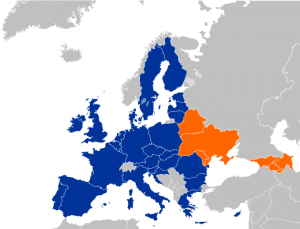 The AEGEEan: Adrian, the Eastern Partnership Project concluded in Zaragoza with a standing ovation to the team. Now is the turn for the EaP[2]: why was it decided to launch a second ‘edition’ of the EaP?
The AEGEEan: Adrian, the Eastern Partnership Project concluded in Zaragoza with a standing ovation to the team. Now is the turn for the EaP[2]: why was it decided to launch a second ‘edition’ of the EaP?
Adrian Browarczyk: Since 2010 many things have changed. The EU program developed into an important diplomatic tool in frames of the Neighbourhood Policy. A significant number of binding agreements has been signed between interested sides and the level of bilateral cooperation between EU and EaP countries is quite gratifying even though some of the target countries proved their independence of choice in a surprising way (i.e. Armenia suddenly assigned to Customs Union roadmap at the end of 2013). Nonetheless, internally we also managed to step further by bringing the issue closer to an ordinary AEGEEan by means of a series of conferences, workshops, trainings and cultural events. In total we did a great job we are still proud of. Such backpack filled in with valuable experiences made us feel that we cannot leave the matter that quickly – it appeared that many crucial challenges are still far ahead which obviously means we are obliged to keep going with the undertaking Alla Resheten and others are parenting.
Which points is this edition going to have in common with its predecessor?
First of all, I would like to emphasise that even if we decided to keep the name of the project, we share the logo in a refreshed version and the team structure to a certain point resembles the previous one, we are basically a new creation issued by people who significantly didn’t contribute to EaP before. Nevertheless, as for the points we do share, I am proud to state that some of the members of EaP, namely Alla Resheten, Daryna Skryl and Armenak Minasyants, granted us with their support and advice – they form today a consultancy body which i.e. points out things we could focus on and motivates us to work further on things they find important. Furthermore, regarding the thematic sphere, a new project crew came up with the idea of centering on civil society development in six program countries as well as on promotion of active citizenship and raising awareness of its importance within our network, mainly in the EaP area. These points coincide with the priorities EaP had before, yet we aim at developing them by adding the value of structured dialogue and studies on gender equality in target societies.
And which new things are you planning to introduce?
I would like to begin with the team structure. Firstly, we introduced a position of the Impact Measurement Manager. This move was motivated mainly by our willingness to examine the impact we have in a structured way, keeping it transparent and helpful for generations to come. Secondly, when I was thinking about the strategy our project should implement, I realized that we need a group of people helping us in seeking for materials, analyzing resources and supporting in content creation. These are the reasons our Research team was constituted. Thirdly, as for the project’s plans, I would see us closely cooperating with locals from EaP region in terms of promoting liaison relations, organizing events related to main project aims and also sharing an overview on things we may not be aware of. Being visible externally by strengthening links with our partners (i.e. Civil Society Forum) and taking active part in shaping policy AEGEE-Europe strives for are among goals I would like to achieve with our team.
Can you tell us about activities that you are currently planning?
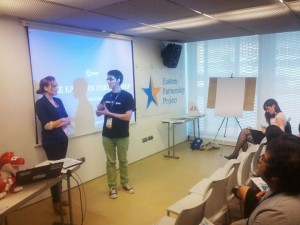 As we are currently brainstorming about the action agenda I am only able to name these ones we really would like to happen. Apart from organizing a series of trainings on youth participation and related topics, we are planning to help locals in hosting Active Citizenship Action Days. The event formula will be chosen in cooperation with hosting antenna, nonetheless we would like to follow the example of the convention YVote 2014 Project has created. Moreover, as we do see the importance of democratic processes, we have established already a link with the Election Observation Project which allows us to contribute to a wide range of election observation missions. Some of our members participate in the Short-Term Observer E-Learning course organized by OSCE /ODIHR in order to gain the knowledge that will allow them to legally examine elections’ reality mainly in the Eastern Partnership region. Regarding other initiatives we plan to undertake I would mention a two-week long “Bus/Train tour” through Poland, Belarus, Ukraine and Moldova with participants from the Eastern Partnership area and other European countries. The event will target the promotion of the structured dialogue at all levels and will also underline the importance of being an active citizen in mentioned countries. Panel discussions with experts, different workshops and trainings will be organized in order to achieve the main project goals. As for the activities we would like to hold in a bigger external perspective I would name the ones where we are considered as partners: the side event of the Eastern Partnership Civil Society Forum that will take place this autumn in Tbilisi and a series of initiatives mentioned by Armenak Minasyants, the Policy Officer on European Integration, in his Action Agenda. Eventually I am sharing with you our current action achievements: apart from publishing a couple of articles, participating in EaP Young Leaders Forum, organizing workshops at Zaragora and NWM Poznan, we recently supported the conference on recent Ukrainian events in Lille and we set up a cooperation with AEGEE-Bratislava in order to provide them with content during their SU organized along with AEGEE-Lviv and AEGEE-Odessa. Two other ‘work-together’ suggestions appeared lately from Europe On Track 2 and EuroArab sides – stay tuned and do not miss updates on our brand new website!
As we are currently brainstorming about the action agenda I am only able to name these ones we really would like to happen. Apart from organizing a series of trainings on youth participation and related topics, we are planning to help locals in hosting Active Citizenship Action Days. The event formula will be chosen in cooperation with hosting antenna, nonetheless we would like to follow the example of the convention YVote 2014 Project has created. Moreover, as we do see the importance of democratic processes, we have established already a link with the Election Observation Project which allows us to contribute to a wide range of election observation missions. Some of our members participate in the Short-Term Observer E-Learning course organized by OSCE /ODIHR in order to gain the knowledge that will allow them to legally examine elections’ reality mainly in the Eastern Partnership region. Regarding other initiatives we plan to undertake I would mention a two-week long “Bus/Train tour” through Poland, Belarus, Ukraine and Moldova with participants from the Eastern Partnership area and other European countries. The event will target the promotion of the structured dialogue at all levels and will also underline the importance of being an active citizen in mentioned countries. Panel discussions with experts, different workshops and trainings will be organized in order to achieve the main project goals. As for the activities we would like to hold in a bigger external perspective I would name the ones where we are considered as partners: the side event of the Eastern Partnership Civil Society Forum that will take place this autumn in Tbilisi and a series of initiatives mentioned by Armenak Minasyants, the Policy Officer on European Integration, in his Action Agenda. Eventually I am sharing with you our current action achievements: apart from publishing a couple of articles, participating in EaP Young Leaders Forum, organizing workshops at Zaragora and NWM Poznan, we recently supported the conference on recent Ukrainian events in Lille and we set up a cooperation with AEGEE-Bratislava in order to provide them with content during their SU organized along with AEGEE-Lviv and AEGEE-Odessa. Two other ‘work-together’ suggestions appeared lately from Europe On Track 2 and EuroArab sides – stay tuned and do not miss updates on our brand new website!
At the same time, the protests in Ukraine struck short after the Agora in Zaragoza. Has it influenced the ideas of the project in some way?
We feel much more motivated and eager to follow the thematic direction we have chosen. Recent events in Ukraine proved that the state of active citizenship there still remains a challenge to work on. Both sides of these clashes showed that Ukrainian people are not fully acquainted with the model of civil society other European countries share. Therefore, we would like to contribute to changes that will surely happen not only in Ukraine but also in the whole region. We would like to support the EaP youth in their call for democracy and the rule of law. I feel that with our project we are able to have an impact to a certain extent on the birth of the societies completely aware of their rights.
What about you, Adrian: what motivated you to be the Project Manager?
It was a conjunction of different circumstances. The main reason I considered becoming the Project Manager was Alla’s suggestion at the previous EaP live meeting in Brussels last spring. I was thinking about it a lot during summer holidays, noodling over whether my leading skills and strengths are sufficient for such task. When I counted up the possibilities this challenge brings along I decided on stepping further and taking the responsibility of managing the project. From the very beginning I had people around who supported me with so much needed advice at that time. With Roland Papp (AEGEE-Budapest) and Marta Wnuk (AEGEE-Poznań) we dealt together with the first tasks and shaping the idea we would like to implement straight after Spring Agora Patra. I would also like to mention my personal interest in the Eastern Partnership issue, which has been developing since I was accepted as a member of the project’s team in 2012. My motivation grew when I had a possibility to represent AEGEE-Europe with Armenak Minasyants at Eastern Partnership Youth Forum in Kaunas last October. Since then everything seems to be moving in the right direction.
During your time in the first Eastern Partnership Project, which were the most valuable lessons that you learnt?
I finally got used to function in the international environment of youth activists who really did see the importance of the matter they worked on. We faced many quaint questions which I liked a lot as at the same time I was developing my interest in specific areas (I did research on Moldovan and Transnistrian youth and topics related to the internet freedom in Azerbaijan). We used to work late with grant applications and other tasks which actually determined my further work profile – EaP team mates receive my emails even at 4 in the morning. Another lesson I learnt is that while cooperating with partners from EaP region you must be very patient because some of the topics you touch are sometimes differently perceived. Nonetheless, over one year of active membership made me feel that I acquired enough knowledge to work on my own from now on.
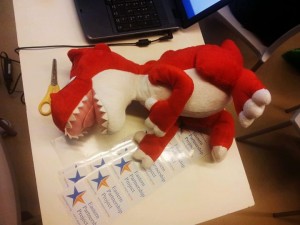 Which are the outcomes you would like the project to have?
Which are the outcomes you would like the project to have?
As a team we are certain that adding a youth perspective to the Eastern Partnership initiative of the European Union will be a significant contribution to building a united European society. I believe that we will be able to influence the recognition of youth power in target societies and that our work will contribute to establishing a strong civil society based on youth engagement. Consequently, I do hope we will successfully raise awareness on the role that active citizenship has in the transition states and that we will obtain young people with knowledge and tools regarding citizens’ rights and duties. I also believe that, by means of our actions in cooperation with the Election Observation Project, we will prove the importance of the participation in voting processes. Finally, I wish we will effectively promote and therefore increase effectiveness of Eastern Partnership program youth involved in the structured dialogue led with EU and regional stakeholders
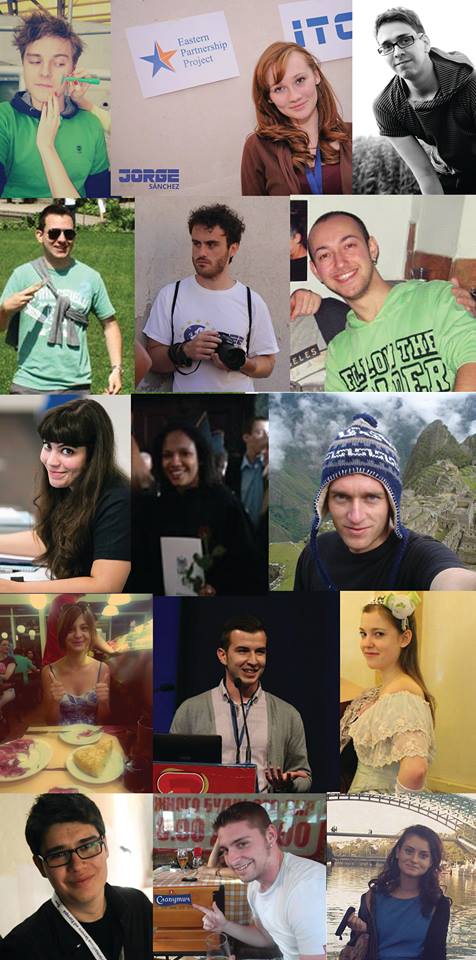 Team structure of the Eastern Partnership Project:
Team structure of the Eastern Partnership Project:
CORE TEAM:
- Project Manager – Adrian Browarczyk, AEGEE-Poznań
- Content Managers – Roland Papp, AEGEE-Budapest and Marta Wnuk, AEGEE-Poznań
- Impact Measurement Manager – Léa Hannaoui-Saulais, AEGEE-Lille
- Financial Manager – Claudio Armandi, AEGEE-Napoli
- FR Manager – Zoltán Hradszky, AEGEE-Budapest
- PR Manager – Mert Can Yilmaz, AEGEE-Ankara
TEAM MEMBERS:
- FR Support team: Izawetta Manuel, AEGEE-Poznań and Cerem Çavdar, AEGEE-Ankara
- PR Support team: Clemens Adler, AEGEE-Karlsruhe and Alice Nitsch, AEGEE-Bamberg
RESEARCH:
- Damiano Deidda, AEGEE-Cagliari
- Saskia Heller, AEGEE-Hamburg
- Mara Bubberman, AEGEE-Groningen
- Ferran Huidobro Casamitjana, AEGEE-Tarragona
- Ivan Bielik, AEGEE-Brno
Written by Anna Gumbau, AEGEE-Barcelona


